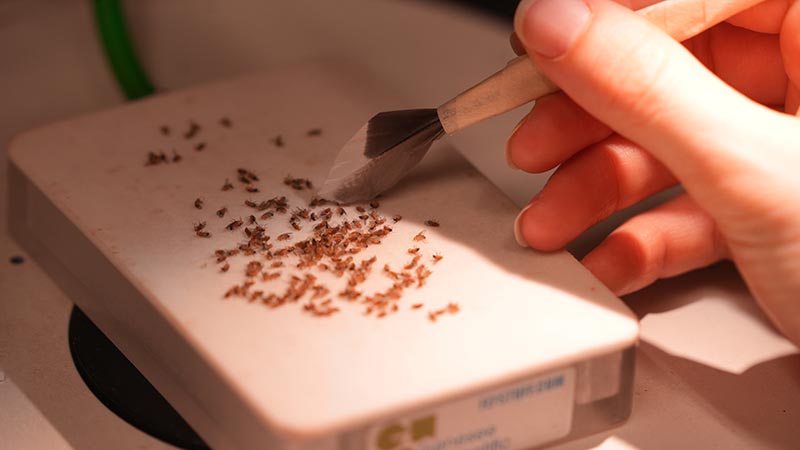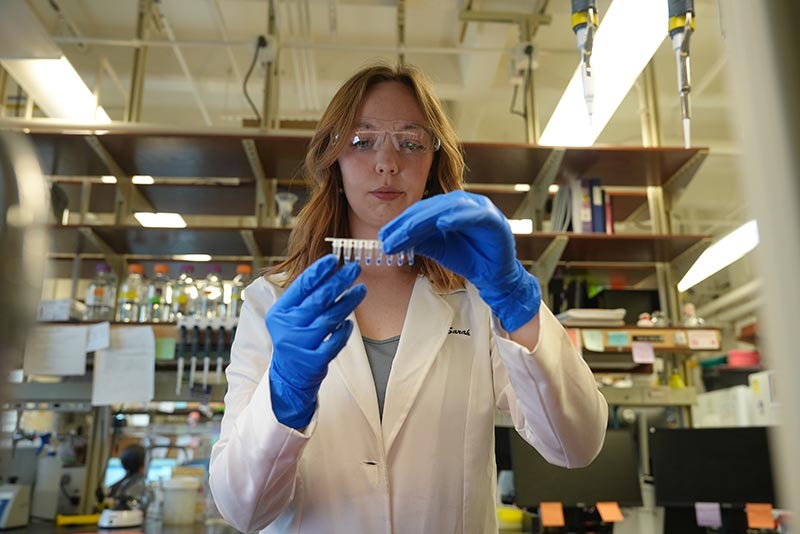Sarah Stanhope - Graduate Ag Research Spotlight
I love the process of going through protocols start to finish. You come in every day and say, ‘Nobody in the world knows this yet, and I’m going to try to figure it out.’
- Sarah Stanhope, PhD candidate, Department of Biochemistry
The student
Sarah Stanhope likes investigating things: “I always asked a lot of questions,” she says. Inspired and supported by a “phenomenal” high school AP biology teacher in her hometown of East Brookfield, Massachusetts, Stanhope earned an undergraduate degree in biology at Salem State University in three years before coming to Purdue to begin her PhD in fall 2020. Stanhope had intended to pursue medicine — until she got hooked on undergraduate research and learned about the many different directions a doctorate in a STEM field could take her. “My research advisor said, ‘It’s a big world for scientists out there,’” she recalls. She chose Purdue for its research reputation and facilities and the welcoming environment she encountered during a recruitment visit. “I enjoyed every faculty member that I spoke to,” she recalls. “There were a lot of labs I was interested in.” Stanhope’s advisor is Vikki Weake, associate professor of biochemistry.
The research
“In the Weake lab we study neurodegeneration, specifically ocular disease — loss of vision and progression of blindness,” Stanhope says. Her research uses Drosophila (fruit fly) as a model organism. “Their eyes are comparable to human eyes, so we’re able to study aging neurodegeneration quite quickly using this model, in zero to 60 days instead of years,” she explains. Stanhope focuses on a specific protein that works in a branch of metabolism important for regulating epigenetic processes within the eye. Weake, she adds, “knows when to be hands-on or when to take a step back and allow you to make your own choices for your projects, which I enjoy now that I’m getting more senior in the program.”
Opportunities
Stanhope received departmental fellowship awards in 2020 and 2022 and a National Institutes of Health (NIH) T32 fellowship for drug discovery and development training in 2021. In addition to covering two years of her salary and research supplies, the fellowship enabled her to cross-train in a different lab. Splitting her second and third years between the Weake lab and the lab of Andrew Mesecar, previous department head of biochemistry and Walther Professor in Cancer Structural Biology, “has been incredible,” Stanhope says. “I’ve been able to build up two vastly different skill sets.” Stanhope recently was awarded an NIH F31 fellowship, which she says will give her freedom in the lab to try additional experimentation. In August she also will begin a 16-week internship with Eli Lilly and Company, an opportunity she credits to the T32 fellowship that supported her interest in drug discovery. Her research has been published in several journals.
Future plans
Following her internship, Stanhope will return to campus to write and defend her thesis before graduating in spring 2025 and seeking a job in industry. “I like the fast pace of industry, and because there are more secure funds, you’re able to generate data a lot more quickly and see the real-world impact from your work,” she says. Away from the lab, she enjoys yoga, Pilates and time with her fiancée, who is also a biochemistry graduate student, and friends.





